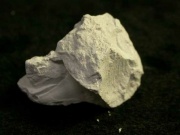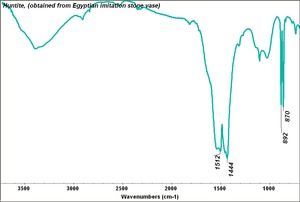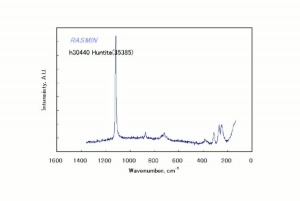Difference between revisions of "Huntite"
Jump to navigation
Jump to search
| Line 6: | Line 6: | ||
[[[SliderGallery rightalign|Huntite PMA.TIF~FTIR (MFA)|huntiteRS.jpg~Raman]]] | [[[SliderGallery rightalign|Huntite PMA.TIF~FTIR (MFA)|huntiteRS.jpg~Raman]]] | ||
| − | == | + | ==Physical and Chemical Properties== |
Microscopically similar to calcite. Moderate birefringence with strong interference colors. | Microscopically similar to calcite. Moderate birefringence with strong interference colors. | ||
| Line 19: | Line 19: | ||
|} | |} | ||
| − | == | + | ==Resources and Citations== |
| − | + | * B. Ford, I.MacLeod, P.Haydock, "Rock art pigments from Kimberley region of Western Australia: identification of the minerals and conversion mechanisms." Studies in conservation 39, no. 1 (1994), pp. 57-69 | |
| − | |||
| − | |||
| − | |||
| − | |||
* Nicholas Eastaugh, Valentine Walsh, Tracey Chaplin, Ruth Siddall, ''Pigment Compendium'', Elsevier Butterworth-Heinemann, Oxford, 2004 Comment: Refractive index: w=1.679; e=1.500 | * Nicholas Eastaugh, Valentine Walsh, Tracey Chaplin, Ruth Siddall, ''Pigment Compendium'', Elsevier Butterworth-Heinemann, Oxford, 2004 Comment: Refractive index: w=1.679; e=1.500 | ||
Latest revision as of 16:48, 9 September 2022
Description
A soft, white mineral composed of magnesium calcium carbonate. The mineral huntite was first described by Faust in 1953 and its use as a pigment by ancient Egyptians was identified by Riederer in 1974 (Eastaugh et al 2004).
Physical and Chemical Properties
Microscopically similar to calcite. Moderate birefringence with strong interference colors.
| Composition | Mg3Ca(CO3)4 |
|---|---|
| Refractive Index | ~1.625 |
Resources and Citations
- B. Ford, I.MacLeod, P.Haydock, "Rock art pigments from Kimberley region of Western Australia: identification of the minerals and conversion mechanisms." Studies in conservation 39, no. 1 (1994), pp. 57-69
- Nicholas Eastaugh, Valentine Walsh, Tracey Chaplin, Ruth Siddall, Pigment Compendium, Elsevier Butterworth-Heinemann, Oxford, 2004 Comment: Refractive index: w=1.679; e=1.500


